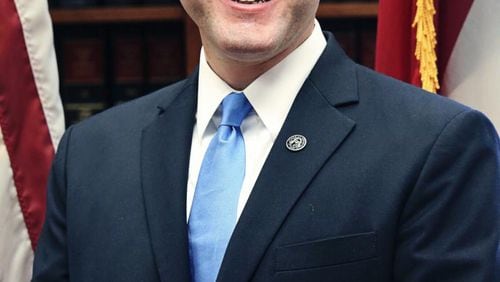Georgia law requires open government even when a private party is carrying out the public's work, Attorney General Christopher Carr argued in a brief filed Monday in the Northside Hospital open records case before the Georgia Supreme Court.
"The Attorney General respectfully urges the Court to hold that the Georgia Open Records Act creates an implied contractual obligation that requires any private person or entity to produce any non-exempt record that it prepared, maintained, or received in the performance of a service or function for or on behalf of an agency," the brief said.
Credit: Carrie Teegardin
Credit: Carrie Teegardin
The Georgia Supreme Court asked the Attorney General's office to file an opinion in the hotly-contested case that started when attorney E. Kendrick Smith requested documents from Northside under the state's sunshine law.
Attorney General Carr didn't clearly say in the brief whether or not he believes the specific records Smith requested are subject to release under the Act. But Carr did say that the Georgia Supreme Court should reverse the ruling in the case by the Georgia Court of Appeals, saying that lower court used the wrong test when reaching its opinion that favored Northside.
Carr also said Northside made a flawed argument with its narrow interpretation of the circumstances under which an organization is subject to the Open Records Act. "The Act speaks broadly to encompass any 'service or function' performed by a private person or entity for or on behalf of an agency," the attorney general said.
Northside Hospital in Atlanta is a public facility owned by the Hospital Authority of Fulton Court. The authority created the non-profit Northside Hospital Inc. to operate the hospital system. A previous decision by the Georgia Supreme Court determined that non-profit organizations running public hospitals are subject to state's Open Records Act. Journalists and members of the public have relied on this ruling for years to obtain records from hospitals.
However, lower court rulings in this case have favored Northside, which has argued that it is a private organization that is not subject to the act. Northside says Smith is working on behalf of a competitor and is trying to obtain trade secrets from Northside.
Smith requested documents related to Northside's "$100 million acquisition" of four physician practices. The request came after an Atlanta Journal-Constitution story in 2013 that documented big increases in patient bills after the acquisition of two of the practices, which are oncology groups.
Credit: Carrie Teegardin
Credit: Carrie Teegardin
The case is being closely watched by news media, health care executives and advocates for open government from across Georgia. Northside and the AJC have been at odds over this issue for several years. In 2013, Northside told the AJC it was not subject to the Open Records Act in response to a request for documents.
for CEOs at metro Atlanta’s nonprofit hospitals for a story that ran in 2014.
While Carr didn't reveal whether he thinks these specific records must be released under the law, he did begin the brief with a strong statement in favor of transparency.
"The attorney General, like most Georgians, believes that 'open government is essential to a free, open and democratic society'" Carr said, citing state law. "Accordingly, the Attorney General - as a champion of open government, and as the State's chief legal officer - urges the Court to honor the plain text of the Georgia Open Records Act, which embodies the State's 'strong public policy . . . in favor of open government.' "
The attorneys in the case made oral arguments before the Georgia Supreme Court in April. A decision is expected in the fall.
About the Author





/cloudfront-us-east-1.images.arcpublishing.com/ajc/P7DYBH6TO7FEKG4SUXQQKADRXE.jpg)



